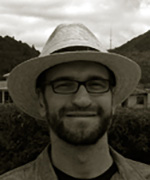UC San Diego Arts and Humanities Awarded Four Hellman Fellowships
Published Date
By:
- Cynthia Dillon
Share This:
Article Content
The University of California San Diego’s Division of Arts and Humanities significantly increased its presence on the recently released list of 2016 – 2017 Hellman Fellowships, a university program designed to provide financial support to promising faculty for activities that enhance progress toward tenure. Last year’s divisional recipients included an associate professor from the Department of History, but this year four junior faculty earned recognition. Making up one-third of the 12 awardees, they are: Amy Marie Cimini, Department of Music; Deborah Isobel Stein, Department of Theatre and Dance; Matthew Werner Vitz, Department of History; and Alena Williams, Department of Visual Arts.
“The Division of Arts and Humanities is earning recognition because of the incredible abilities and commitment of its faculty,” noted Dean Cristina Della Coletta. “It is gratifying and humbling to work among this amazing collective of colleagues.”
According to Executive Vice Chancellor Suresh Subramani, the Hellman Fellowship recipients were chosen from an outstanding pool of candidates who applied for the program through Academic Affairs.
“This excellent new group of Hellman Fellows will soon receive notification detailing the amount of their individual awards and the availability of funds,” he noted.

Deborah Isobel Stein
For example, Stein learned that she is receiving support to research and write a play about a family of Jewish-American women from 1920 to 2020.
“I'm thrilled! It's such an honor, on a campus with a faculty as talented and accomplished as the faculty at UC San Diego,” said Stein. “It also feels like a vote of confidence in my continued trajectory as a playwright and faculty member. It feels kind of life-changing, to be honest.”
According to Stein, a playwright, director, teacher, and co-artistic director of Stein | Holum Projects (SHP), the play she envisions will be written in the American Realist tradition—set entirely in a kitchen—and will interrogate assumptions about what constitutes “realism,” what makes a story significant and who gets to tell it. Inspired by her own efforts to fill gaps in her family stories, she said she will use the Hellman Fellowship to research and write forgotten women back into history.
“Specifically, I am going to use the funding to support research, travel and writing,” explained Stein. “I will interview family members and friends of family, as well as to travel to Poland and Israel. I've never used my family history as source material, and I'm really grateful for the support of the Hellman Fellowship, which will give me the support to take the time to do it right.”

Matthew Werner Vitz
Vitz, an assistant professor with expertise in Latin American and Caribbean history, received funding to complete his book manuscript on the 20th-century environmental history of Mexico City. His fellowship also will fund preliminary research on his second book project, a transnational environmental and cultural history of tourism in regards to Mexico, from Acapulco to Cancun, including Mexico City, Chilpancingo and Chetumal, as well as New York City, Washington D.C. and Dallas.
“I am thrilled to have received the Hellman award,” admitted Vitz. “It provides crucial funding support for me to prepare a successful tenure file. But the Hellman award is important in other ways too. Because of the award, my book will be better than it otherwise would have been, and I will be able to immediately contribute to the burgeoning field of tourism studies thanks to my research on the environmental and social ramifications of resort development in Mexico.”
To earn the award, applicants must be full-time, non-tenured, ladder-rank faculty, who are approaching their third year of appointment or beyond. The university gives preference to assistant professors of great promise who have not previously received substantial extramural funds targeted to new investigators, and who have a demonstrated need for additional funds. Preference also is given to those for whom the award would make a significant difference in their advancement toward tenure.
Individuals can receive a maximum of $50,000 in funding, which may be used for summer salary support, research and laboratory equipment, travel and other research-related expenses, including salaries for students or research assistants. Funds may not be used to replace faculty salaries during the academic year. Finally, each recipient must be in the assistant professor rank at the time the transfer of funding occurs.
Besides the four arts and humanities recipients, other Hellman Fellows include faculty from the divisions of Social Sciences, Biological Sciences, and Physical Sciences, Jacobs School of Engineering and Rady School of Management.
The Hellman Fellowship Program was established at UC San Diego in 1995 through the generosity of Chris Hellman and the late Warren Hellman. This valuable program is designed to provide financial support and encouragement to young faculty in the core disciplines who show capacity for great distinction in their research and creative activities. Funds awarded are intended as one-time support for activities that will enhance the individual's progress towards tenure.
The UC San Diego Division of Arts and Humanities is listed among the top 33 programs globally, according to U.S. News and World Report.
Share This:
You May Also Like
Stay in the Know
Keep up with all the latest from UC San Diego. Subscribe to the newsletter today.



